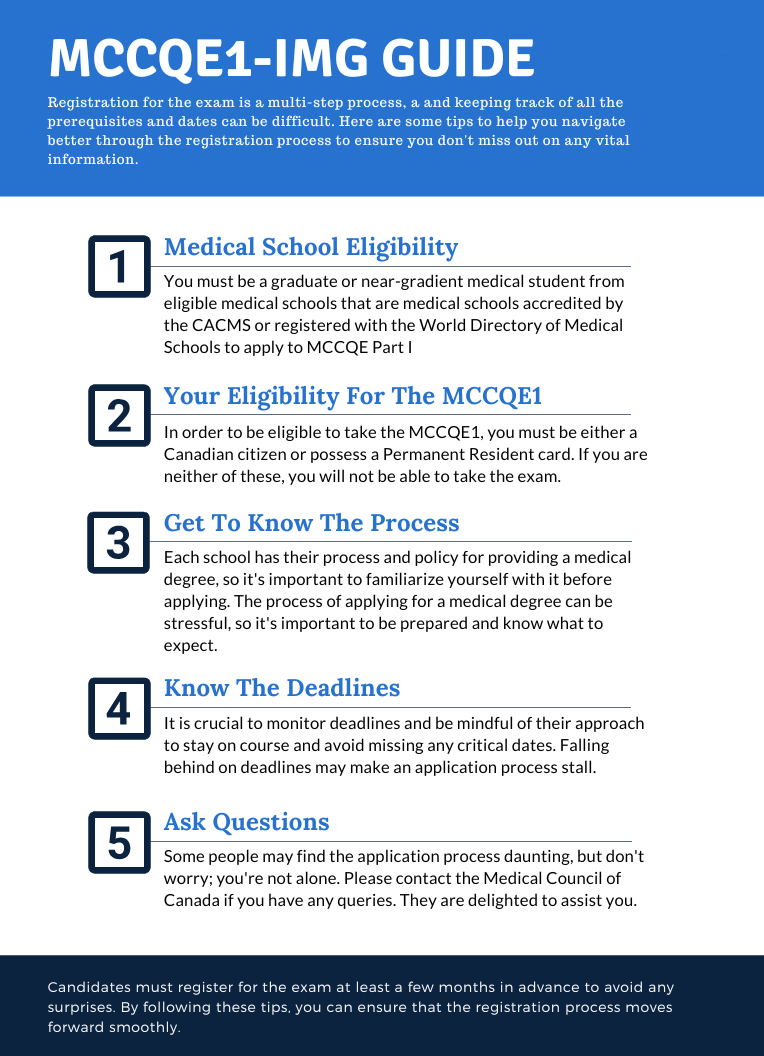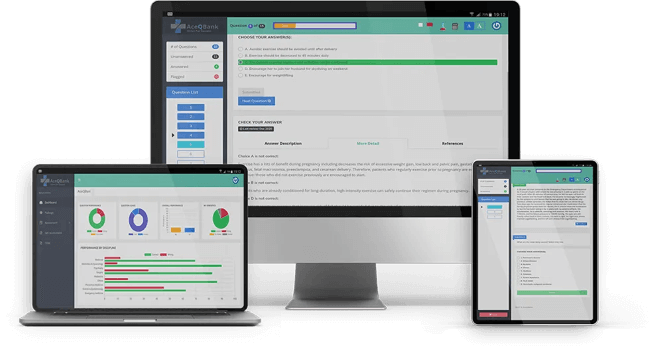Concise Guide on How to Apply for the MCCQE1 Exam?

For Canadian and foreign medical graduates, passing the Medical Council of Canada Qualifying Examination (MCCQE) Part I is a crucial step in obtaining a medical license in Canada. The MCCQE1 exam measures a candidate’s clinical decision-making skills and core medical knowledge at a scale comparable to a medical student pursuing a medical degree in Canada. The MCCQE Part I is offered in French and English, is administered by the Medical Council of Canada (MCC), and is based on the MCC Objectives, which are organized under the Canadian Medical Education Directions for Specialists (CanMEDS) roles.
The MCCQE1 registration is a multi-step process that begins with submitting an application to the MCC. The MCC will review the applicant’s credentials to ensure they meet the eligibility requirements for the exam. Once the applicant is deemed eligible, they can register for the exam. Applicants must first establish an account to register for the exam. Then, upload the necessary documents, and begin the registration process.
The MCCQE1 application process might seem difficult, but we are here to help! This article provides an overview of the application process from start to finish. In addition, we will offer some tips to help you avoid potential pitfalls and try to answer some frequently asked questions.
What Is the MCCQE Part I?
The MCCQE Part I is a licensing examination required by medical regulatory authorities in Canada in order to practice medicine. The MCC is the national organization that regulates the examination process in Canada to assess the clinical knowledge of medical students and graduates to ensure that all medical graduates have the necessary foundation to enter residency training.
The MCCQE1 exam is divided into two sections: Section A, 210 Multiple-choice questions, and Section B, 38 Clinical cases. The exam’s questions and clinical cases are based on the MCC Objectives, which are organized under the CanMEDS roles, and, unlike the United States Medical Licensing Examination (USMLE), the MCCQE1 exam is clinically oriented.
Learn more about the MCCQE1 Format
Why Apply for The MCCQE1 Exam?
There are several reasons why more physicians are choosing to practice in Canada. One reason is that Canada is seen as a welcoming place for international medical graduates. This is due to Canada’s diversity and inclusion policies and the fact that Canada is home to many world-renowned hospitals and research institutions.
Another reason for the increase in physicians practicing in Canada is the high quality of the residency and fellowship programs. These programs provide excellent training and prepare physicians for a successful career in medicine. Additionally, many of these programs are funded by the government, which makes them more affordable than programs in other countries.
However, this tendency is likely to continue for a number of reasons. First, the qualification requirements for IMGs have decreased in recent years, making it even easier for them to come to Canada to work. Second, the Canadian medical system is one of the best in the world, which is likely to attract even more physicians from around the globe.
It used to be a difficult process to become a qualified physician in Canada, with several exams and tests to pass. The current process, on the other hand, is substantially easier, needing simply an English language exam, passing MCCQE part I, and Nac OSCE. If you studied medicine in English, you might not even need to take the English test. Therefore, now is an excellent time to pursue your dream of becoming a physician in a free country.
Who Is Eligible to Take the MCCQE1?
Every year, many medical students and graduates from Canada and across the world try to sit for the MCCQE 1 exam in order to be to apply for postgraduate training in Canada. The MCC, on the other hand, is an organization that determines eligibility for the MCCQE1 exam. You must have a valid medical license from a recognized medical school to take the test.
International medical graduates who obtained their medical degree from an accredited program outside of Canada or a Canadian medical graduate who has been certified by the MCC can register and apply for the MCCQE1 exam, and if they successfully pass the exam, they can apply for a residency position at any of the province’s training hospitals.
Read more on MCCQE 1 eligibility
How To Apply for The MCCQE1 Exam?
The whole process of applying for the MCCQE1 exam might be difficult, but the application steps for the exam are simple and can be completed online. However, it is important to note that the process can become cumbersome if simple mistakes are made. Here is a step-by-step guide on correctly applying for the MCCQE1 exam.
The first step is to create an account on physiciansapply.ca. You can log in and start the application process after creating your account. When the account is created, the next step is to access the online registration form. The form will ask for your personal information, educational background, and contact information. Once you have completed the form, then submit your application.
The third step is to wait for your medical degree to be verified. Once your degree is verified, you will be placed on the National Physician Database and receive an official registration confirmation.
The final step is to access the exam schedule, choose an exam date, and go through the payment process. The MCC will then send you an email confirming your registration. The email will include important information about the examination, such as the date, time, and location.
MCCQE1 – IMG Guide for Application
Registration for the exam is a multi-step process, and it is important to be aware of all the requirements and deadlines to avoid surprises. Here are some tips to help you navigate better through the registration process:
1. Check the medical school eligibility.
You must be a graduate or a medical student on track to graduate from an “acceptable medical school” to apply for the MCCQE Part I. An acceptable medical school is a medical school accredited by the Committee on Accreditation of Canadian Medical Schools (CACMS) or included in the World Directory of Medical Schools.
2. Check your eligibility for the MCCQE1
The exam can be taken in over eighty countries worldwide at a Prometric centre. Unlike the United States Medical Licensing Examination (USMLE), you must be either a Canadian citizen or have a permanent resident (PR) card before you can sit for the exam.
Read more about MCCQE1 exam eligibility, and for additional information, visit the MCC application and eligibility webpage or contact MCC.
3. Familiarize yourself with the process.
While each medical school has its particular process and policy for giving a medical degree, it is important to become familiar with it before applying. This will ensure that you submit the degree requirements on time and avoid falling behind. For example, some schools may require you to submit a written request for your diploma, while others may have an online system.
4. Know the deadlines.
Keep an eye on deadlines. It’s important to monitor deadlines and be mindful of their approach to stay on course and avoid missing any crucial dates. Falling behind on deadlines may make an application process stall.
5. Ask questions.
Although the application process might seem difficult, keep in mind that you’re not in it alone. If you ever have questions, the staff at your MCC will be more than delighted to assist you. We will support you on your journey because we want you to succeed.
The MCCQE1 exam registration process is not difficult, and most candidates register for the exam online. However, it is better to start registering for the exam at least a few months in advance to avoid any surprises in the process, particularly if you are a non-Canadian international medical graduate (IMG) from a commonwealth country or in the immigration process.
By adhering to these tips, you may prevent surprises during the registration process and ensure everything goes well.
What is the cost of applying for the MCCQE1?
The MCCQE1 is a very important exam for medical students; however, it is less expensive than the National Assessment Collaboration Objective Structured Clinical Examination (NAC OSCE). The fee for the exam is $1375, but it is a worthwhile investment to take the time to prepare for the exam and make sure that you pass. You will forfeit this fee if you withdraw your application after the deadline.
What is the MCCQE1 eligibility window?
You must submit the required documents, and if your application is accepted, you will be granted a twelve-month window to take the MCCQE Part I. This is referred to as the Eligibility Window.
Does the MCCQE1 eligibility window expire?
Yes, the eligibility window expires once the applicant takes or withdraws from the MCCQE1 exam. Therefore, you must plan ahead and ensure you are ready to write the exam before the eligibility window expires. The opportunity is lost after you take or withdraw from the MCCQE1 exam.
How long is the eligibility window Valid?
The MCCQE Part I eligibility period lasts one year from the date your application is accepted. Exams should be taken during this time; otherwise, the eligibility window will have to be extended, which will cost you $ 110 before it expires.
How many times can you take MCCQE1?
The MCCQE Part I is administered at Prometric centres in Canada and worldwide on scheduled dates throughout the year. Candidates are allowed only a few attempts at the MCCQE Part I. The number of attempts is limited to four. If you do not pass the exam on your third attempt, you will have to wait 12 months before being able to repeat the exam.
The Process of Taking the MCCQE1-Exam Day
Test day can be a very stressful time for many. There are a lot of unknowns, and it can be hard to know what to expect. However, after reading this part, the majority of those unknowns should be clear, allowing you to feel prepared and confident when taking your test. We’ll cover topics like what to bring to the exam, what to expect on exam day, and what to do if you have a problem. Here’s what to do on exam day:
- On your testing day, arrive at the Prometric Test Center 30 minutes before your scheduled testing time.
- When you arrive at the Prometric centre, you must provide the Scheduling Permit you got when you applied for the MCCQE1 exam and the identification. Your signature and image must be included in your identification. Acceptable forms of identification include the following:
- Passport
- Driver’s license with photograph
- Permanent Resident (PR) Card
- Do not forget to sign a test centre log and store your personal belongings in your assigned locker. No personal items, such as a watch or wallet, are allowed in the test room. This includes cell phones and other electronic devices. Before entering the exam room, these items must be placed in a locker.
- You will receive a marker and laminated writing surfaces during the test. Please inform the test center staff if you fill the laminated writing surface. They will provide replacement laminated writing surfaces, do not wipe them clean yourself.
- Do not walk into the exam room. Prometric Centre personnel will escort you to your assigned testing station and provide brief instructions on using the computer equipment. You may then take a brief tutorial before starting the exam.
- You have a short break before beginning the CDM part of the exam. Break time is allowed for 45 minutes. You may leave the examination room during the interval to use the bathroom, grab a sip of water, or have a snack. You are not permitted to converse with other pupils.
People frequently overstate their break time and take longer breaks than they should and lose time. To avoid this, look at the clock in the corridor as you exit the examination room. This will give you an idea of when you should return and log in to the examination room.
Need Help with Preparation for The MCCQE1 Exam
Proper preparation is essential for success on the MCCQE1 exam, and you should make every effort to earn the maximum possible score on the MCCQE1 exam. If you’re having trouble keeping to your study plan or if certain objectives are challenging for you, get the help you need to pass the MCCQE1 exam on the first attempt.
Ace Qbank has your back with over 2400+ high-yield questions, many Clinical Decision-Making (CDM) cases, and several self-assessments available to challenge and push you to your limit.
To prepare for the MCCQE1 exam, we developed the Ace Qbank based on the Medical Council of Canada (MCC) objectives. Our team reviews the question bank regularly based on current guidelines and recommendations, and we implement any changes we make as soon as possible to enhance your learning experience. Our objective is to keep the information up to date and in compliance with medical standards of care to avoid surprises during the test. At Ace Qbank, we’ve got you covered.
We invite you to sign up for the Ace Qbank demo today and see the difference our elite question bank makes!






